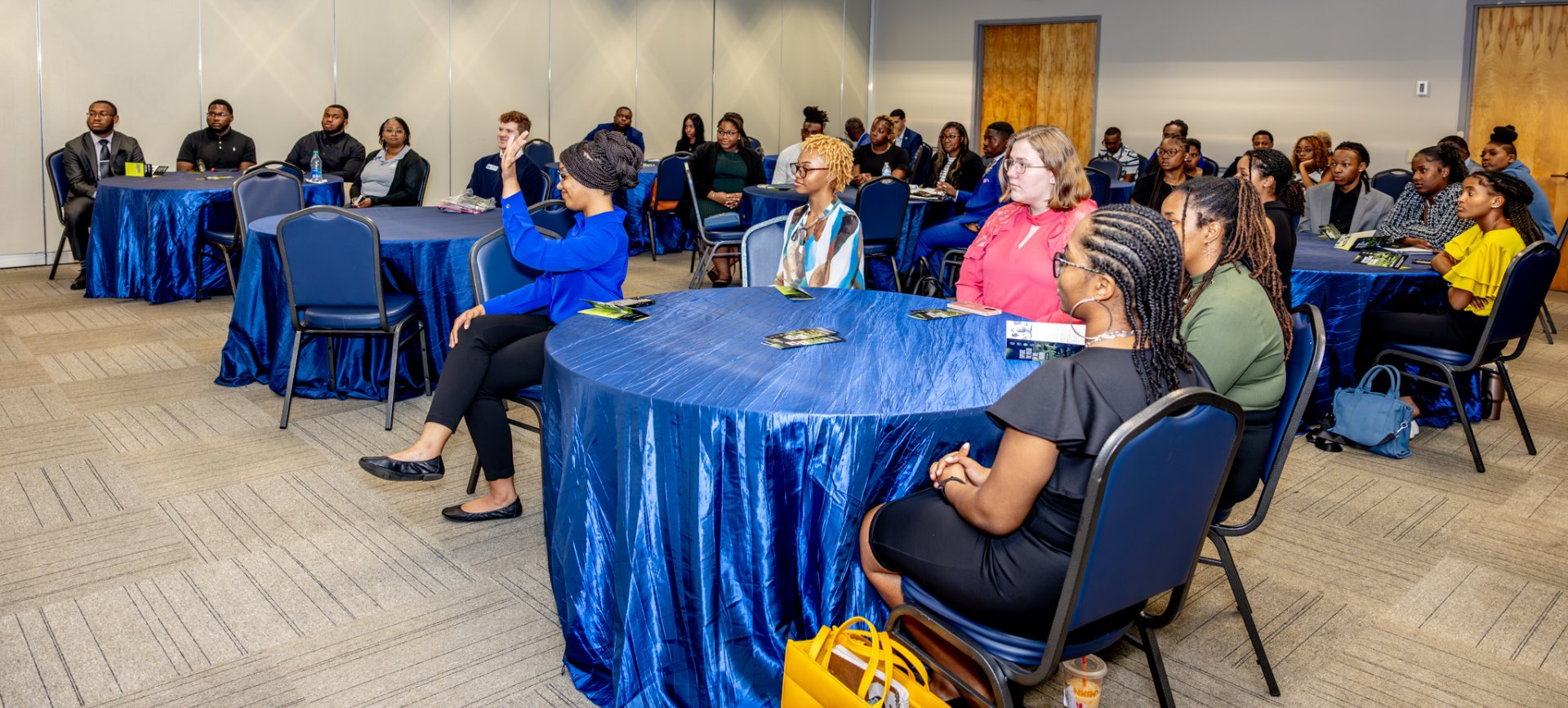Deputy Secretary of Agriculture Xochitl Torres Small and Congressman Sanford Bishop Jr. made an important stop at Fort Valley State University (FVSU) to meet with campus leaders and students interested in pursuing a career in agriculture.
Small, the first Latina to hold her position, and Bishop kicked off their visit by joining FVSU President Dr. Paul Jones and representatives from the university and U.S. Department of Agriculture (USDA) for a roundtable discussion.
Jones thanked Small and Bishop for their continued support of FVSU and other Historically Black 1890 Land-grant Universities.
“The 1890 land-grant system is a critical system for the United States,” Jones said. “We have been able to move the needle forward because of your support of the Farm Bill.”
When discussing workforce development, Small commended FVSU’s efforts in this area. She mentioned the NextGen program, an initiative by the USDA to enable institutions to engage, recruit, retain, train and support students to build and sustain the next generation of the food, agriculture, natural resources and human sciences workforce. FVSU is a subrecipient of a recent NextGen grant.
Bishop, a member of the U.S. House Appropriations Committee, emphasized that the 1890 universities play a tremendous role in the agriculture industry. In addition, he saluted Secretary of Agriculture Tom Vilsack and the Biden-Harris Administration for supporting the next generation of agriculture by pushing policies that will elevate everyone in this country.
As the conversation continued, Small wanted to know how FVSU is attracting students to the university to pursue a degree in agriculture.
Dr. Keith Howard, dean of the College of Agriculture, Family Sciences and Technology, shared, “We focus on experiential learning and provide internships and dynamic curricula in alignment with industry and USDA needs. It’s about engaging students and mentorship. We work with students and show them why ag is so important.”
Jones added that scholarships, including the USDA 1890 National Scholars Program and FVSU’s 1890 Scholarship Program, have made a tremendous difference by removing some financial barriers for students.
“Our enrollment has increased double digits in the last couple of years, so that’s exciting. I don’t think we would have that kind of growth without those scholarships,” Jones said.
Furthermore, Dr. Mark Latimore Jr., associate dean for Extension, shared the importance of alumni, who interact with current students to inform them of many opportunities with the USDA. He also noted the important role small farmers play in working with students to help advise them on how to operate farming equipment and care for animals.
Dr. Govind Kannan, vice president of economic development and land-grant affairs, discussed the various ways FVSU is reaching communities and supporting small and mid-size farmers. This includes projects such as the Center for Agriculture Innovation and Entrepreneurship, broadband expansion, a new Mobile Health Unit and precision agriculture.
Also, FVSU’s formation of external advisory groups to meet industry needs has been instrumental, which benefits student recruitment and fundraising, added Howard.

In addition to meeting with leadership, Small and Bishop took the time to visit with more than 20 agricultural students. Some of the students’ questions included USDA’s priorities to support historically Black colleges and universities and careers in agriculture through USDA. Small also had an opportunity to share her story when asked about her career journey.
“I never thought I was going to work with USDA,” she admitted.
Her grandparents immigrated from Mexico, her dad was a school bus driver and her mom was a teacher. A scholarship allowed her to spend the last two years of high school in southern Africa, which gave her a chance to study with people all over the world. She studied international development in college and found that she wanted to make lasting change. This led to her serving as a field representative and then becoming a U.S. representative for the fifth largest district in the country. She is the first woman and first person of color to represent New Mexico’s second congressional district.
Before her current role, Small served as undersecretary for rural development. She oversaw loans and grants to provide infrastructure improvements, business development, affordable housing, community facilities, and high-speed internet access in rural, Tribal and high-poverty areas.
Small, noting that risks are worth taking even if you fail, told the students, “Representing people matters. Each time you think about your role in agriculture, I hope you know the people you represent and the ideas you bring to the table, experiences matter and will have an impact and make a difference.”

